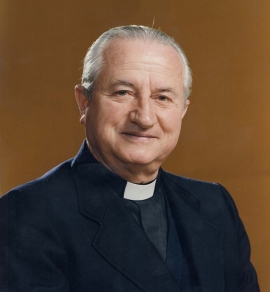Born in Sondrio, Italy, in 1920, to working-class parents, he was the eighth of 10 children - including two other Salesian priests, Angelo, who passed away in 2010, and Francesco, today in the community of Sesto San Giovanni. It was at home that he received the first authentic Christian testimony: "Dad and mom had reserved the first place for God, not for things, not for work, not for savings, not for health, not for gain," Fr Angelo Viganò once said.
Growing up in his town's Salesian oratory, where there were Salesians who had known Don Bosco in person, he attended the aspirantate of Chiari and then the novitiate of Montodine, becoming a novice at just over the age of 16.
The decisive and unexpected turn came at the end of his philosophical studies in Turin, when he learned from his superiors that his application to leave for the missions had been accepted, and that he was destined for Chile. But he had never submitted this application. He expressed his perplexities to his superiors, but he was asked for availability anyway. His answer was simply: "If you send me, I will go."
In Santiago de Chile he carried out his theological training. He then became Director of the Theologate, was Professor of Dogmatic Theology at the Catholic University of Chile, participated in the Council as an expert theologian for Card. Raúl Silva Henríquez, SDB. He was appointed Provincial of Chile in 1968 and General Councilor for Formation in 1971, before being elected Rector Major six years later - a position he held for 18 years until his death.
"Father Viganò was a great Rector Major, who knew how to set and accompany the Congregation in the transition to a redefinition of itself, in the light of the Council, in dynamic and creative fidelity to Don Bosco, and with the same apostolic passion for young people, especially the most abandoned," said Fr Pascual Chávez, IX Successor of Don Bosco. "A man of spontaneous laughter, of exceptional optimism, far-sighted ... he left a very rich Salesian magisterium, through his letters which he himself said were 'not to be read, but to be studied' ... In the resolutions taken on the occasion of his priestly ordination, he showed himself to be demanding with himself, understanding with others, available unconditionally to God and His will: 'When God asks, one can never say no.'"


